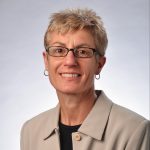ESA Spring 2023 President’s Report
by ESA President Sharon Collinge
As current president of ESA, I was pleased to be able to travel to Washington, DC, to chair the most recent ESA Governing Board meeting, May 16-17. The meeting was hybrid, with five board members meeting in person with the executive director and senior staff in DC, and the other six members participating virtually. The ESA council speakers also participated in the meeting, and we heard from several committee chairs. Board members that were participating remotely reported after the meeting that they felt very engaged, thanks to a meeting agenda with several important and timely topics (and thanks to good technology!).
In addition to discussing several key programmatic milestones of the past six months, the board participated in some generative discussions, looking ahead to future opportunities and plans. Among those were discussing open science and open data, and its implications for ESA members and publications. Martin Halbert, Advisor on Public Access at NSF, joined the board to discuss their draft plans to provide public access to federally funded research. Halbert and others in the federal agencies are looking for feedback from the community. One area that ESA has concerns about is equitable access to publishing as the US moves towards policies for more open science. The board also discussed the recently completed, draft Future Visioning Report and had an open discussion on how ESA can evolve to adapt to a changing world and serve more ecologists by extending our reach beyond the academy to private and public sector ecologists and the general public. The traditional scholarly society activities (publishing, meetings, education, and outreach) may need to evolve to serve broader audiences.
The board discussed reports on programs, including the exciting changes that will be implemented at the 2023 Annual Meeting in Portland. To serve more ecologists, the program committee has expanded the workshop and special session offerings. These will occur all week, alongside a robust scientific program. ESA staff reported success in meeting the Henry Gholz SEEDS Field Trip Endowment contribution challenge match and hitting the first target a year early (now at over $450K). A new endowment is being launched to support additional programs in diversity and inclusion, notably the new ESA Excellence in Ecology Scholarships. The goal is to support this important program into perpetuity by raising at least $400K in the next few years.
Emilie Graves, council speaker-elect, who presented in place of speaker Lin Meng, highlighted themes from the council meeting held in February and brought forward three goals developed for 2023 and beyond: (1) to foster networking, (2) to encourage greater engagement from members, and (3) to support student participation. I look forward to working with the council leadership team to advance these goals for the benefit of our community.
As the board does every May, we reviewed ESA finances, including investments and year-to-date spending. Despite challenges in the market, ESA unrestricted net assets (reserves) remain healthy. This allows the board to invest a small amount of seed funding (up to 4%) on new projects intended to bring in new revenue. The board approved launching a professional development program to provide workshops and short courses to members and the broader community. Stay tuned for more information about this at Career Central at the Annual Meeting and for the kick-off later this year. Two on-going projects, support for DEIJ activities and new journal launches will continue to be supported next year. The board also passed the 2023-2024 fiscal year budget as recommended by the Finance Committee. The budget recognizes grant activities in education and diversity and also allows for continued staff support across ESA to keep bringing robust products and services to the community.
Dan Stover, chair of the recently formed Task Force on Naming Awards, presented their report on how ESA could deal with awards that are currently named for people, and considered how the ESA names awards for individuals or the activities that they recognize. The report included recommendations for moving the names of awards from the title of the award to the award descriptions. The board will be gathering further information to consider a few issues including how awards are endowed (named funds), the potential for changing award names to clarify the importance of and reason for awards to those unfamiliar with the ESA, and whether the proposed policy would also apply to section awards.
Throughout the meeting board members asked tough questions and made timely decisions. We are now looking ahead to the Annual Meeting in Portland and want to hear from all members. We will be holding a town hall to gather feedback on the Future Visioning Report and to discuss how you can serve your society by volunteering with your section, serving on a committee, or running for office (2023 Annual Meeting (eventscribe.net)). Please join us to help shape the future of ESA!
| Sharon Collinge |
|---|
| President, ESA |
 |
 |